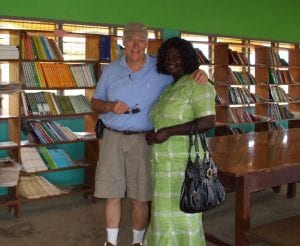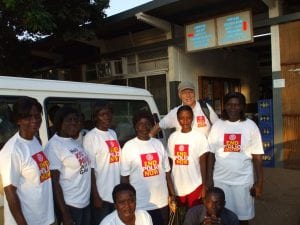October 15, 2011
Life-altering passion for a nation in need
By Chris Machado
If environmental and societal issues in Ghana are analogous to physics problems, Dr. Stephen J. Mecca ’64 & ’66G is taking a similar approach to the solutions: one step at a time.
For the past half-dozen years, Mecca, a professor of physics, and his family have dedicated themselves to many humanitarian efforts in the West African country. The list includes work conducted by the Ghana Sustainable Aid Project (GSAP) — a non-governmental organization co-founded by his granddaughter that promotes healthy and sustainable development in developing communities, including Pokuase Village in Ghana.
Mecca’s specific efforts include teaching a semester at the University of Ghana, working with the GSAP and the Girls’ Exploration and Empowerment Club to encourage female students to continue their schooling, and creating the Books to Ghana program that has delivered thousands of books to the University of Ghana.

Perhaps Mecca’s greatest contribution has been designing and coordinating the installation of groundbreaking toilet facilities that will have far-reaching impacts on sanitation and health in Ghana.
Experts estimate that 50 percent of the residents in sub-Saharan Africa defecate in the open or in contraptions. By not having proper bathroom facilities, the citizens’ overall health is affected by tainted drinking water and various diseases.
During a seven-week stay in Ghana this summer, Mecca oversaw the planning, construction, and installation of the Pokuase Village’s first effective sanitation facilities—one private toilet, a 10-stall co-op facility, and a five-stall school bathroom.
The modern facilities, which house a sink and toilet, use the Microflush-Biofil technology developed by Mecca, Colin MacDonagh ’10, and Ghanaian engineer Kweku Anno. The system works by harvesting rainwater, which is used for the sink in the stall. The resulting gray water is transported to the toilet, which flushes using just about two-thirds of a cup of water. The waste is then filtered twice before being deposited in a small leeching field. Two years later, that waste will be used as compost.
The toilets — with the exception of the school facility — are used by residents through a co-operative system, which calls for them to pay about 70 cents per month. Mecca said the system will allow the facilities to be self-sustaining and cut down on the transmission of a range of diseases.
In May, the Bill & Melinda Gates Foundation recognized the potential for the Microflush-Biofil system by awarding Mecca and the Ghana Sustainable Aid Project $100,000 through its Grand Challenges Explorations initiative.
Partial funding for Mecca’s research and work in Ghana also has been provided by the College through the Committee on Aid to Faculty Research.

On a recent two-week trip back to Ghana — his seventh journey there — Mecca said he was overjoyed by how well the toilets are working.
“The first facility we opened (the single stall) is going really well,” he said. “One man said to me, ‘Kids who are using the facility aren’t getting their usual stomach cramps and diarrhea.’ There hasn’t been a single incident since they started using the toilet.”
Mecca hopes the facilities will be the model for similar facilities throughout the 170 districts of Ghana.
“The one-toilet facility is working so well with 27 or 28 people using it, I’m thinking smaller facilities might be better,” he explained. “People don’t believe these are real toilets because there is no smell and no flies.”
He said the next steps he needs to take to “scale up the project” include finding a way to produce 1,000 toilets per week, growing more local earth worms to digest the waste, and secure appropriate financing for small revolving loans.
“I can prove the technology works,” he said. “If I received $40 million, we could solve the problem in Ghana in five years.”
He added, “All the country’s problems are intertwined. Pure water is a problem, which is linked to a lack of sanitation, which is intertwined with school attendance and disease, among other issues. These problems are avoidable with a little inventiveness, a little ingenuity, commitment, and hard work.”
During the summer trip to Ghana, Anne Ruelle ’13 (Greenwood, Minn.), a global studies and Spanish double major, accompanied Mecca and conducted sanitation assessments throughout the village. She went with nurses on school visits and infant weigh-ins. Ruelle interviewed more than 70 women, men, and students on the health of their family and the sanitation facilities they used.
“The independent work I did on the sanitation interviews was one of the most valuable parts of the whole experience,” exclaimed Ruelle, who assisted Mecca on other projects as well.
Mecca said more students will be returning to Ghana with him during the spring, when they’ll be working on developing hand-washing stations that use the same technology as the toilet facilities.
“My program isn’t a travel program. Students get engaged because you give them a problem to solve,” he said. “It gives them a new perspective on their own culture. The potential for change in individual students is enormous.”
This story was originally published in the Fall 2011 issue of Providence College Magazine.





